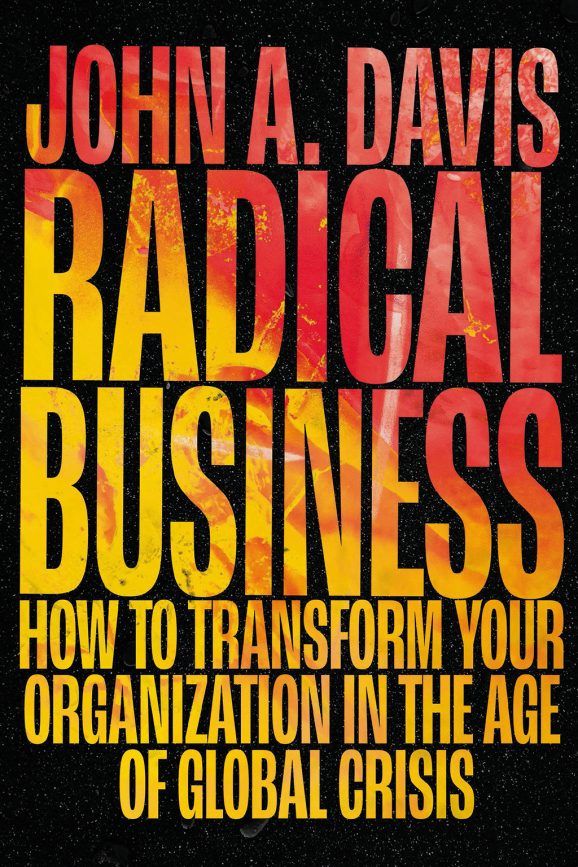Be part of the solution

John E. Kaye
- Published
- Home, News, Sustainability

Faced by a world in crisis, businesses should focus their value creation in four key areas, says award-winning academic and business leader John Davis
What role must businesses play in today’s volatile world? The answer has far reaching implications for companies, business education, and business leadership. Companies cannot continue to operate in the 21st century using 20th century business models. Business education cannot continue to teach siloed disciplines as the world needs people with cross-disciplinary skills. Business leaders cannot continue to act as if financial performance is their only report card, without also being concerned about the impact of their decisions on their company’s contribution to society.
One hundred and fifty years from the start of the industrial revolution, we have learned a fair bit about the impact that business activities have had on the world. Global GDP has grown dramatically to more than US$100tn today, strengthening economies, building a stronger middle class, and creating new technology that has improved our quality of life. But there has been a cost, including worsening environmental damage, widening economic inequality, and deepening social injustice. Business leaders already have more than enough to do day-to-day to ensure growth each quarter and year. Where is the rule book describing how to do this while also confronting these larger crises? How we get through today will determine whether we end up in a better place tomorrow.

Change is needed, and soon
I’ve spent the past 20 years working with companies in 40 countries and the most successful ones offer lessons on what businesses can do to improve. The best view their enduring contribution to society through four value filters: Reputational, Organisational, Societal, Financial. However, far too many businesses struggle to understand the interdependence among these four values because leaders don’t lift their view above the weeds, consequently missing important opportunities to change for the better.
Reputational value
Lead by example. That sounds easy but being a business leader today is not for the faint-hearted. Your company’s reputation in society depends on how successfully you galvanise the interests of stakeholders while ensuring the financial health of the business. You earn trust by delivering on the promises you make and the values you espouse. When society trusts you, you are given temporary permission to continue operating. But if you violate trust, society can revoke that permission, devastating your reputation. Boards are integral to this as they play a major oversight role of management, strategy, and stakeholder interests. Their fluency in today’s challenges, like sustainability, is vital to improving a company’s contribution to a healthier world.
Help is on the way. Competent Boards, a company founded by Helle Bank Jorgensen, provides professional development for boards and executives to gain the knowledge and understanding required to tackle today’s converging social, environmental, and economic challenges. As Warren Buffet said: “It takes 20 years to build a reputation and five minutes to ruin it. If you think about that, you’ll do things differently.” When leaders truly lead by example, reputational value improves.
Organisational value
Company cultures have deeply rooted orthodoxies, relationships, and unwritten rules. Anything that upsets these comfortable routines spurs resistance, so how do you know where to even begin the change effort? There are likely people in your company who have been part of highly collaborative projects. They understand the sense of purposeful accomplishment that animates such work. Tap into their wisdom and experience to help inspire a workplace and company culture that feels more like a cause.
Another example of help on the way is Janice Lao, an Environmental Scientist and Development Economist who has influenced change everywhere she has worked by helping company cultures adopt a cause-like mindset. She is “others-focused” and understands the power of inspiring a community to action. She created a mathematical and economic model for aviation’s carbon-neutral strategy and has developed standard-setting sustainability solutions for carbon trading, biodiversity, textile upcycling and even refugee hiring practices. She doesn’t hector or “guilt” people about what we are doing wrong.
Instead, she invites them to do well by doing good as part of a larger sustainability movement. Janice epitomises the proverb: “If you want to go fast, go alone; but if you want to go far, go together.” When people believe their work matters, they will increase their discretionary effort with others beyond what is expected because of the greater good they perceive they are pursuing, and organisational value will be strengthened.
Societal value
This is a set of actions designed to enhance the quality of life and wellbeing of the communities you serve. The people within want to know what your company is doing to contribute to the health of the community dynamic, beyond providing jobs.
Are you part of the social fabric, or are you simply occupying space because of financial convenience? Are the business leaders seen as community energisers, or de-energisers? When your company is absent from the local community’s life, “us-vs-them” tensions are exacerbated, making reputation building far harder, and damaging your relationships with stakeholders. A laser focus on societal value is good for investors. 73% say being socially responsible positively contributes to their ROI. However, only 36% of consumers trust business leaders to do what is right. This is both a problem and opportunity. The problem is evident: you aren’t trusted. The opportunity is also clear: get deeply engaged in the community by demonstrating that you care.
My final example of a business leader influencing positive change is Mac McKenzie, CEO of the Bridge Institute. Bridge Institute works with an ecosystem of partners from business, government, and non-profits to build peaceful and inclusive communities by solving today’s most formidable problems (violence in societies, solutions for Covid-19, sexual assault, working towards the UN’s Sustainable Development Goals, and much more). Bridge Institute’s approach gives people and organisations the tools needed to close gaps and work collaboratively, developing and strengthening their ability to continue working for their collective good well into the future. Their ecosystem approach offers lessons for any business seeking to build meaningful societal value through community partnerships.
Financial value
Business health is measured by its financial condition, which is a function of how successfully it embraces the three values described above. The blind pursuit of financial gain absent of a deliberate emphasis on the three values above may lead to short-term success, but the business won’t survive for long if profits and shareholder wealth are the only measures of value. In short, financial value is the result of success in strengthening the first three values. Furthermore, sources of capital are changing, and you would be well served to pay careful attention to these shifts. The factors shaping what is considered valuable in society have been underway for years. The risks associated with investments once considered safe are increasingly risky, and opportunities that were once considered risky are now central to your company’s market relevance and survival. Younger investors favour companies with credible ESG initiatives.
The question is not if change is needed, but how quickly can you be part of it? Consider climate change. A Swiss Re study forecasted the financial impact of climate change on the economies of 48 countries (90% of global economy). The study found:
- 18% reduction in global GDP if no actions are taken (3.2°C increase)
- 14% reduction if some actions are taken
(2.6°C increase)
- 11% reduction if further actions are taken
(2°C increase)
- 4% reduction if Paris targets are met
(below 2°C increase).
If you choose not to act, then you are helping accelerate future climate disasters, worsening human and financial costs, and contributing to GDP reductions, certainly not a reputation-enhancing decision. So why not decide instead to change by being part of the solution?
In short, all four of these values matter, but it is critical that you build your business around the first three. Only then will sustained financial value occur.
ABOUT THE AUTHOR


John A Davis is an award-winning academic, business leader and author of ‘Radical Business: How to Transform Your Organization in the Age of Global Crisis’ published by Emerald.
RECENT ARTICLES
-
 These European hotels have just been named Five-Star in Forbes Travel Guide’s 2026 awards
These European hotels have just been named Five-Star in Forbes Travel Guide’s 2026 awards -
 McDonald’s Valentine’s ‘McNugget Caviar’ giveaway sells out within minutes
McDonald’s Valentine’s ‘McNugget Caviar’ giveaway sells out within minutes -
 Europe opens NanoIC pilot line to design the computer chips of the 2030s
Europe opens NanoIC pilot line to design the computer chips of the 2030s -
 Zanzibar’s tourism boom ‘exposes new investment opportunities beyond hotels’
Zanzibar’s tourism boom ‘exposes new investment opportunities beyond hotels’ -
 Gen Z set to make up 34% of global workforce by 2034, new report says
Gen Z set to make up 34% of global workforce by 2034, new report says -
 The ideas and discoveries reshaping our future: Science Matters Volume 3, out now
The ideas and discoveries reshaping our future: Science Matters Volume 3, out now -
 Lasers finally unlock mystery of Charles Darwin’s specimen jars
Lasers finally unlock mystery of Charles Darwin’s specimen jars -
 Strong ESG records help firms take R&D global, study finds
Strong ESG records help firms take R&D global, study finds -
 European Commission issues new cancer prevention guidance as EU records 2.7m cases in a year
European Commission issues new cancer prevention guidance as EU records 2.7m cases in a year -
 Artemis II set to carry astronauts around the Moon for first time in 50 years
Artemis II set to carry astronauts around the Moon for first time in 50 years -
 Meet the AI-powered robot that can sort, load and run your laundry on its own
Meet the AI-powered robot that can sort, load and run your laundry on its own -
 Wingsuit skydivers blast through world’s tallest hotel at 124mph in Dubai stunt
Wingsuit skydivers blast through world’s tallest hotel at 124mph in Dubai stunt -
 Centrum Air to launch first European route with Tashkent–Frankfurt flights
Centrum Air to launch first European route with Tashkent–Frankfurt flights -
 UK organisations still falling short on GDPR compliance, benchmark report finds
UK organisations still falling short on GDPR compliance, benchmark report finds -
 Stanley Johnson appears on Ugandan national television during visit highlighting wildlife and conservation ties
Stanley Johnson appears on Ugandan national television during visit highlighting wildlife and conservation ties -
 Anniversary marks first civilian voyage to Antarctica 60 years ago
Anniversary marks first civilian voyage to Antarctica 60 years ago -
 Etihad ranked world’s safest airline for 2026
Etihad ranked world’s safest airline for 2026 -
 Read it here: Asset Management Matters — new supplement out now
Read it here: Asset Management Matters — new supplement out now -
 Breakthroughs that change how we understand health, biology and risk: the new Science Matters supplement is out now
Breakthroughs that change how we understand health, biology and risk: the new Science Matters supplement is out now -
 The new Residence & Citizenship Planning supplement: out now
The new Residence & Citizenship Planning supplement: out now -
 Prague named Europe’s top student city in new comparative study
Prague named Europe’s top student city in new comparative study -
 BGG expands production footprint and backs microalgae as social media drives unprecedented boom in natural wellness
BGG expands production footprint and backs microalgae as social media drives unprecedented boom in natural wellness -
 The European Winter 2026 edition - out now
The European Winter 2026 edition - out now -
 Parliament invites cyber experts to give evidence on new UK cyber security bill
Parliament invites cyber experts to give evidence on new UK cyber security bill -
 EU sustainability rules drive digital compliance push in Uzbekistan ahead of export change
EU sustainability rules drive digital compliance push in Uzbekistan ahead of export change



























